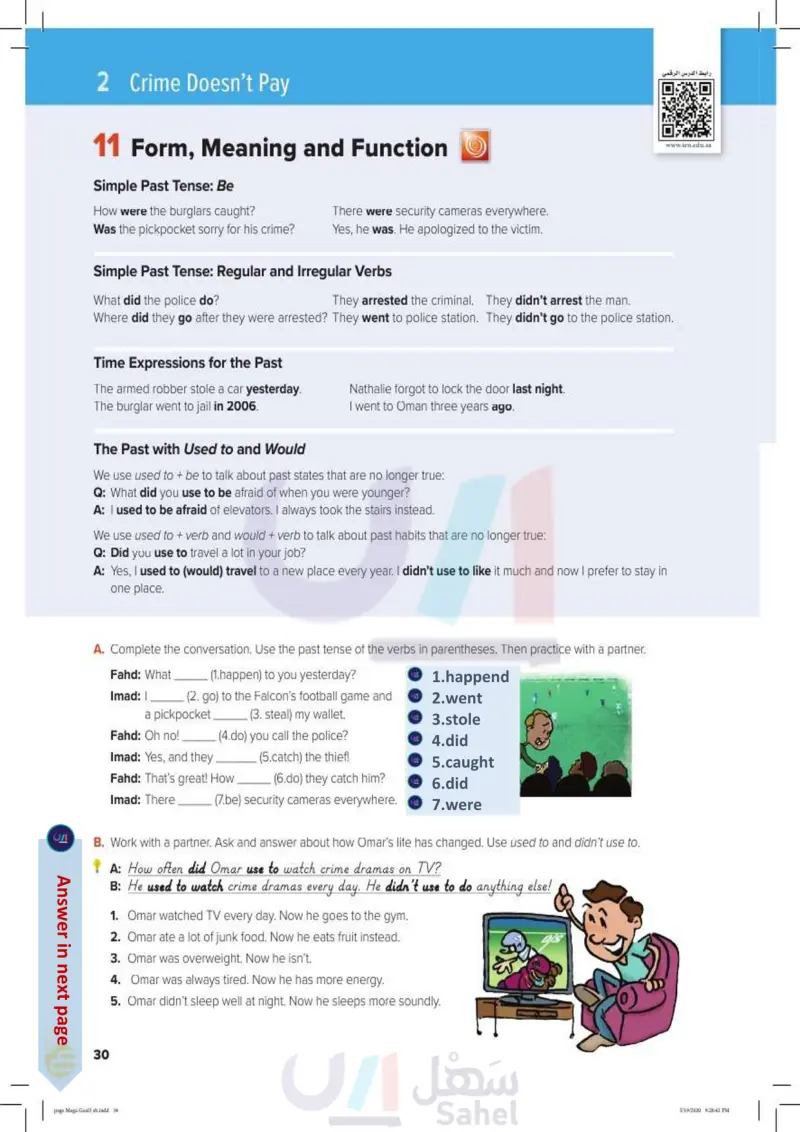Form Meaning and Function - Mega goal 2 - ثاني ثانوي
Term 1
Connect
Unit1: Connected by Technology
Unit2: Crime Doesn’t Pay
Unit3: Far and Away
Unit4: TV Around the World
EXPANSION Units 1-4
Term 2
Unit5: Working 9 to 5
Unit6: Going Green
Unit7: There’s No Place Like Home
Unit8: The Sporting Life
EXPANSION Units 5-8
Term 3
Update
Unit9: Laugh Out Loud
Unit10: You Are What You Eat
Unit11: Amazing Animals
Unit12: What Would You Do
EXPANSION Units 9–12
نشاط unit1: Connected by Technology
نشاط unit2: Crime Doesn’t Pay
نشاط unit3: Far and Away
نشاط unit4: TV Around the World
نشاط EXPANSION Units 1-4
نشاط unit5: Working 9 to 5
نشاط unit6: Going Green
نشاط unit7: There’s No Place Like Home
نشاط unit8: The Sporting Life
نشاط EXPANSION Units 5–8
نشاط unit9: Laugh Out Loud
نشاط unit10: You Are What You Eat
نشاط unit11: Amazing Animals
نشاط unit12: What Would You Do
نشاط EXPANSION Units 9–12
2 Crime Doesn't Pay 11 Form, Meaning and Function Simple Past Tense: Be How were the burglars caught? Was the pickpocket sorry for his crime? There were security cameras everywhere. Yes, he was. He apologized to the victim. رابط الدرس الـ www.ien.edu.sa Simple Past Tense: Regular and Irregular Verbs What did the police do? They arrested the criminal. They didn't arrest the man. Where did they go after they were arrested? They went to the police station. They didn't go to the police station. Time Expressions for the Past The armed robber stole a car yesterday. The burglar went to jail in 2006. Nathalie forgot to lock the door last night. I went to Oman three years ago. The Past with Used to and Would We use used to + be to talk about past states that are no longer true: Q: What did you use to be afraid of when you were younger? A: I used to be afraid of elevators. I always took the stairs instead. We use used to + verb and would + verb to talk about past habits that are no longer true: Q: Did you use to travel a lot in your job? A: Yes, I used to (would) travel to a new place every year. I didn't use to like it much and now I prefer to stay in one place. A. Complete the conversation. Use the past tense of the verbs in parentheses. Then practice with a partner. Fahd: What Imad: | (1.happen) to you yesterday? (2. go) to the Falcon's football game and a pickpocket Fahd: Oh no! Imad: Yes, and they (3. steal) my wallet. (4.do) you call the police? Fahd: That's great! How Imad: There (5.catch) the thief! (6.do) they catch him? (7.be) security cameras everywhere. B. Work with a partner. Ask and answer about how Omar's life has changed. Use used to and didn't use to. A: How often did Omar use to watch crime dramas on TV? B: He used to watch crime dramas every day. He didn't use to do anything else! 1. Omar watched TV every day. Now he goes to the gym. 2. Omar ate a lot of junk food. Now he eats fruit instead. 3. Omar was overweight. Now he isn't. Foamar was 4. Omar was always tired. Now he has more energy. 5. Omar didn't sleep well at night. Now he sleeps more soundly. وزارة التعليم Ministry of Education 2024-3046 MG_02_COMBO_TEXT_2024.indb 30 30/4/24 2:29 AM

O Past Progressive We use the past progressive when we describe what was happening at a specific time in the past. Q: What were you doing at three o'clock today? A: I was driving home from work. We use the past progressive when we talk about a temporary state or action. Q: Have you always lived in Riyadh? Q: What were you doing in Dubai? A: No. A few years ago, I was living in Dubai. A: I was working at a hotel. We use the past progressive with always to describe a repeated or annoying action. My neighbor's son was always getting into trouble when he was younger. We use the past progressive to describe a long action that is interrupted by a short action. I was working on my computer when suddenly the power went out. We use the past progressive to describe two actions that were happening at the same time. While I was studying, my brother was watching TV. C. Read the interview between the policeman and Mr. John Wilkinson. Complete the paragraphs with the simple past tense or the past progressive form of the verb in parentheses. Policeman: What John: | Policeman: Who | were you doing (1. do) at 3 P.M. yesterday, Mr. Wilkinson? (2. be) in the 'Supermarket.' I (3. buy) milk. you (4. shop) with at that time? (5. shop) with anyone. I was alone. John: Policeman: At 3 P.M., a security guard saw you outside the ‘Ski and Snow' store. You (6. park) your car. Is that true, Mr. Wilkinson? John: you Oh yes, that's right. At 3 P.M. I (7. park) my car. But I (8. go) to the 'Ski and Snow' store to buy a ski mask. I the 'Supermarket'... Policeman: What (9. go) to (10. buy) at the 'Supermarket' Mr. Wilkinson? John: Policeman: Why (11. buy) some cheese. you (12. take) the license plate off your car when you were parked next to the 'Snow and Ski' store, Mr. Wilkinson? Ermmmm... .... don't know. John: Policeman: Why (13. say) that you you (14. buy) a ski mask at the 'Snow and Ski' shop, Mr. Wilkinson? John: Ermmm... ..... didn't say that. Did I say that? I meant ........ Policeman: you_ (15. rob) the Stanton Drug Store yesterday, Mr. Wilkinson? PD. With a partner, discuss if you think John Wilkson is guilty or innocent. Give some reasons why Ministry of Educ based on the interview in exercise C. 2024-1446 MG_02_COMBO_TEXT_2024.indb 31 31 30/4/24 2:29 AM



 5
5 













